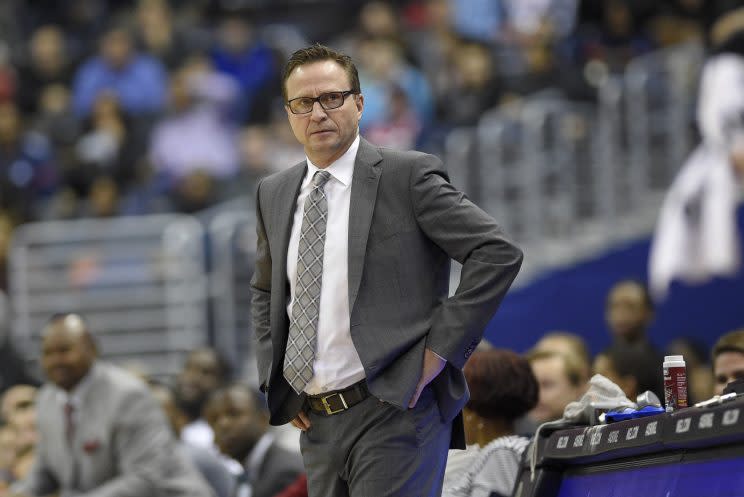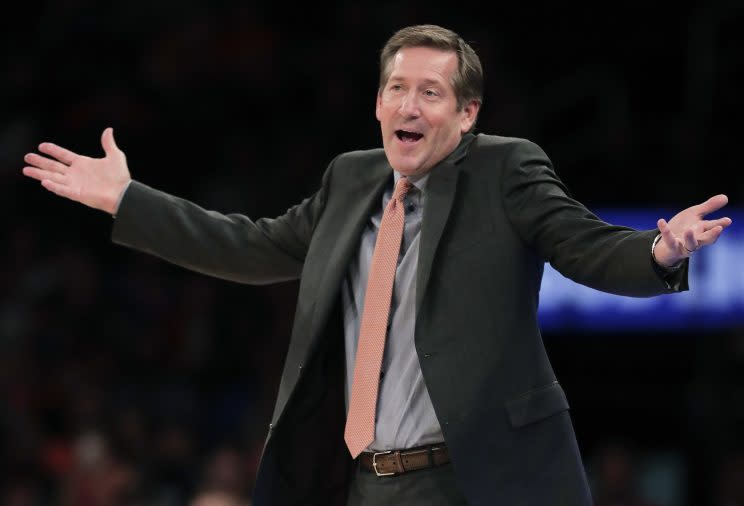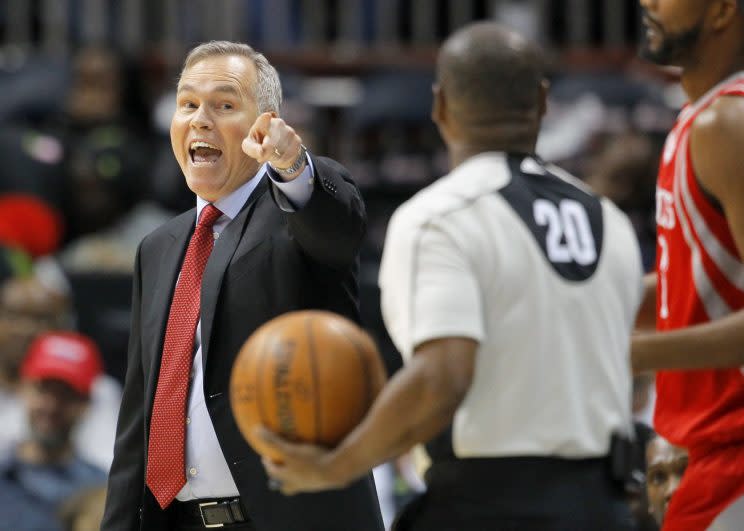BDL's Very Official First-Year Coach Power Rankings

We at Ball Don’t Lie have been knee deep in basketball since the 2016-17 NBA season’s start — previewing all 30 teams, tackling the top 25 storylines, and covering everything else that’s happened since — but we understand casual fans don’t fully dive in until Christmas. That’s why we’re bringing you a series we’re calling NBA Season’s Greetings. Consider it a refresher course on the free agents, coaches, trades, rookies and potential award winners that have shaped the league thus far.
An astonishing 11 teams hired new permanent head coaches this summer. That figure communicates plenty about the state of the NBA, including the degree to which coaches must prove themselves quickly to keep their jobs. The slightest disappointment can lead to an early dismissal.
[Join a Yahoo Daily Fantasy Basketball contest now | Free NBA Yahoo Cup entry]
That’s why, after not even one-third of the 2016-17 season, it doesn’t feel crazy to take stock of where every new coach sits with his franchise. And, as the internet has proven time and time again, there is no better way to judge such things than via very official power rankings.
Here, in reverse order of success, is our take on the first-year coaches around the NBA this season.
11. Scott Brooks, Washington Wizards
Brooks hit the market this offseason as one of the most coveted coaches on the market, a young, well-liked guy with a track record of success over seven seasons with the Oklahoma City Thunder. Even those who bemoaned his various tactical mistakes with OKC had to admit that he would likely bring welcome people skills and a friendly personality to a Wizards franchise in need of a fresh start. If nothing else, the expectation was that he and his smart-guy glasses would help grow the iffy relationship between star point guard John Wall and talented shooting guard Bradley Beal while simultaneously inspiring Washington’s role players to new levels of success.
Instead, very little has gone right for the 9-14 Wizards. Wall still puts up some big stat lines and Beal can still score with anyone at his best, but there’s no sense that they amplify each other’s strengths. The defense ranks in the league’s bottom 10 by points allowed per possession, their depth is pretty much nonexistent, and the entire operation appears felled by the same distrust and lack of cohesion that typified the Randy Wittman era. Brooks seems confused by his team’s failures of effort and desire, which doesn’t exactly speak well to his powers of motivation.
It’s not necessarily all the coach’s fault. As Tom Ziller wrote at SB Nation last week, Wall, Beal, and Otto Porter are Washington’s only effective offensive players, which severely limits Brooks’s lineup options and almost assures long stretches of ineptitude. Maybe no coach could figure out a way to make it work.
Regardless, Brooks did not go to our nation’s capital to ease the transition between disappointment and rebuilding. He was supposed to make the Wizards a playoff participant and perhaps even the top challenger to the Cleveland Cavaliers at the top of the East. Instead, the team isn’t even an interesting kind of bad. They’re just pathetic.
10. Tom Thibodeau, Minnesota Timberwolves
The most promising coaching acquisition of the summer has been the most disappointing of the season so far. The Timberwolves finished last season with several very impressive wins, including the final regular season loss for the 73-win Golden State Warriors, and probably would have been expected to challenge for a playoff spot in 2016-17 even if they hadn’t added a head coach famous for wringing wins out of even modestly talented squads. With Karl-Anthony Towns, Andrew Wiggins, Zach LaVine, Ricky Rubio, and rookie Kris Dunn on one roster, expectations became very high as soon as Thibodeau took the job.
The result has been a team that looks pretty much the same as the one Sam Mitchell coached last year. The Wolves have a few blowout wins and pulled off the biggest comeback of the season on Tuesday at the Chicago Bulls, but they have attracted most attention for a series of third-quarter collapses. At 7-18 with eight losses in their last 10 games, this is a team that needs a real winning streak before they can be said to be improving. Occasional impressive victories aren’t going to cut it, because we already know they have the talent to beat good teams.

Thibodeau was supposed to instill in his young core the intensity necessary to take a leap forward, but it’s arguable that his methods have had the opposite impact. Insiders speak of a team that plays as if it’s afraid to fail instead of playing to win. Those takes might be a little too clean, but it’s hard to deny that whatever they’re trying now isn’t working. The supposedly beautiful marriage between an ultra-talented young team and a coach capable of molding anyone into a passable defender has been quite ugly.
Reasonable people can disagree on the best course of correction. Maybe Thibodeau needs to try different lineups. Maybe players like Wiggins is more of a role player than a star. Maybe Dunn isn’t the finished product we assumed. Maybe the likes of Joakim Noah, Luol Deng, and Jimmy Butler deserve more credit for Thibodeau’s success than the Bulls than we thought.
[Follow Ball Don’t Lie on social media: Twitter | Instagram | Facebook | Tumblr]
Thibodeau is going to be in Minneapolis for at least a few seasons no matter what happens over these last 57 games. However, the early returns from the Wolves suggest that the job is going to take more work than most analysts thought.
7 (tie). Frank Vogel, Orlando Magic; Earl Watson, Phoenix Suns; Dave Joerger, Sacramento Kings
These three are ranked together only because I can’t throw my hands up and claim ignorance. All three of these franchises are in some period of transition or evince an unwillingness to confront their own decay. The Magic just ended a rebuilding project by attempting to trade for veterans and ended up with another roster best equipped to finish 10th or 11th in the East. The Suns are waiting on the development of their young big men before they can hope to return to the postseason. The Kings appear to be inching towards trading DeMarcus Cousins, but don’t appear to hold enough valuable long-term pieces to construct an effective rebuilding process.
What exactly can a coach do in any of these situations? Perhaps he can begin to build a culture, but it’s hard to know how to balance that goal with the short-term expectations of the front offices in Orlando and Sacramento. Watson has the benefit of having been interim coach last season, but his team is still in the middle of a planned break from contention.
The best we can say about any of these three is that they haven’t failed to meet expectations. Consider them incomplete. Unlike the other eight coaches on this list, who should be judged by 20 or 25 games, obviously.
6. Nate McMillan, Indiana Pacers
It’s impossible to assess the 2016-17 Pacers without first considering Larry Bird’s personnel moves this summer. The legendary team president did not just replace Vogel with lead assistant McMillan — he swapped point guards, added score-first role players, and generally moved the squad’s identity away from Vogel’s defense-first approach and toward the fast-paced offensive plans that have become trendy around the NBA. That’s a lot of change for one summer.
It hasn’t really worked. The Pacers defense has tanked, dropping from third in defensive efficiency last year to 19th. At the same time, the offense is only 15th, a meaningful eight-spot improvement that still does not appear to justify such drastic measures. The paint job’s different, but the Pacers look like the same kind of team they were last season — good enough to make the playoffs, but not so impressive as to scare anyone.
So why is McMillan in the dead center of this list and not lower? For one thing, there’s something to be said for steadying the ship during a period of change. He has had to welcome new players into the rotation, put more responsibility on young center Myles Turner, and undertake a new role himself. Those processes have been fairly smooth, and McMillan deserves high marks if only for not ruining Turner’s development into a legitimate star. A 13-12 record is nothing to crow about, but it’s good enough for a team that appears to be coming together.
5. Jeff Hornacek, New York Knicks
Hornacek came into this season with one of the toughest jobs of any coach in the league. Like any Knicks coach, he was expected to produce a winner despite a less-than-ideal personnel situation. More specifically to Knicks coaches of the last few years, he was expected to do it while being forced into running Phil Jackson’s beloved triangle offense. Any coach constricted to a limited set of tactics is bound to have trouble, and it wasn’t much of a surprise to see the Knicks start 3-6 with no real sense of how to develop Kristaps Porzingis into a star.
There’s an argument to be made, then, that the Knicks are now 14-11 and tied for third place in the conference mostly because Jackson announced he doesn’t care if they run the triangle. Hornacek could have done whatever he wanted anyway, of course, but Jackson’s comments ended any chance of controversy. With that system discarded, the Knicks were free to play, and they have the talent to beat plenty of teams. Most importantly, Porzingis has thrived in the new setup and looks every bit a budding superstar.

Hornacek has done a very good job with the club, but it’s important to note that the Knicks’ playoff placement is more reliant on their terrible conference than their actual quality. Wednesday’s loss to the Cleveland Cavaliers showed that they still have a very long way to go to match up with the best the NBA has to offer.
However, home-court advantage in the first round would represent an excellent season for Hornacek and a strong start to his tenure with the club. That’s where the Knicks stand right now, and he and his team deserved lots of credit for it, even if Jackson’s decision to let his team play another style may have meant more than the coach’s direct impact.
4. Luke Walton, Los Angeles Lakers
Injuries and an inevitable downturn in form have poured gallons of cold water on the Lakers’ early dreams of a playoff berth, but it’s still hard to deny the joy that Walton has brought to the NBA’s most consistently successful franchise. The death march that was the last few years of the Kobe Bryant era has been replaced by the positivity of a fresh start. Players who were demeaned by Byron Scott have the chance to prove themselves, and everyone appears compelled to fight for each other in a way they did not before.
It’s possible the Lakers would be this same entertaining group with any marginally competent coach in charge. But Walton seems to have brought the right mix of openness and continuity to a young team, understanding that he has to give them room to grow while simultaneously trying to reinstall the Lakers culture that helped win him his two championship rings as a player. He just feels like the perfect fit.
New challenges will come, and there’s no guarantee that Walton and his players will be able to meet them. For now, though, it’s hard to imagine any Lakers fan is upset that he’s in charge.
3. Kenny Atkinson, Brooklyn Nets
I am comfortable calling the Brooklyn Nets the most inspiring 6-17 team in NBA history. The Nets entered this season with no hope — they have a roster of limited players and cast-offs, they have no first-round picks for several years, and they imported middling free agents this summer only because they had to spend the money somewhere. It would have been very easy for them to become the team everyone avoided on League Pass, a club with nothing to recommend to anyone with any interest in the future of the league.
And yet, while the Nets are only a little better than expected and haven’t happened upon a particularly innovative method of rebuilding, Atkinson has them playing as hard as anyone in the league. They come back from big deficits, push playoff teams farther than they have any right to, and simply do not quit. The motivation is unclear — perhaps the individual players just want to maximize their earning potential — but the result is often thrilling to watch.
Against the odds, the Nets have become one of my favorite teams on League Pass. Instead of wallowing in hopelessness, they’ve turned it into a rallying cry.
2. David Fizdale, Memphis Grizzlies
A lot of analysts could not understand why the Grizzlies fired Dave Joerger, a coach with a track record of success and getting his team to overachieve through injuries. The early returns on Fizdale more than justify the decision. He was brought in to push the offense toward modernity with more 3-pointers and improved spacing, and Memphis has followed through by rising to the middle of the pack in 3s attempted per game. The execution hasn’t always been there, but the proper process is beginning to take shape.
Plus, the Grizzlies have risen to fifth place in the West despite losing several starters for weeks, if not months. Memphis has now managed similarly strong play with a limited roster through three different coaches, so Fizdale will have to share responsibility for these performances with the likes of Marc Gasol and Tony Allen. But he has had to do his share of finessing, whether in keeping Zach Randolph out of the starting lineup despite those absences or finding passable fill-ins for Mike Conley and Chandler Parsons. These are tasks that Fizdale could not have anticipated, but he’s handled them in stride and guided the Grizzlies to the best defensive efficiency mark in the league.
There’s no guarantee that the Grizzlies will be appreciably better when Conley and Parsons return (and for how long?), but they look like one of the postseason’s toughest outs yet again. At worst, Fizdale has started to add new wrinkles while maintaining the Grizzlies’ previous strengths.
1. Mike D’Antoni, Houston Rockets
D’Antoni looked like a consolation prize for the Rockets after an extensive coaching search last spring. Still known as a defense-averse ideologue, D’Antoni came to Houston with a rather poor reputation after messy stints with the Knicks and Lakers. He seemed like a mediocre fit for this job, a coach who would run a great offense but who could compound the Rockets’ existing defensive issues with no premium stoppers in site.

He’s now an early contender for Coach of the Year. The Rockets have been a revelation, playing the fun and loose basketball D’Antoni is known for while pulling together enough strong defensive stretches to keep games from devolving into anything-goes shootouts. James Harden looks like a maximalist version of the fun player he was in OKC, Eric Gordon has rescued his career, and various others look like productive pieces of a team that looks ready to hold on to a top-four spot in the West.
D’Antoni deserves all the praise coming to him, and not just for what he’s done this year. The bad endings to his time in New York and Los Angeles apparently convinced large portions of the basketball world that D’Antoni got lucky with the Suns, but those were toxic situations that would have ruined all but a few figures in NBA history. D’Antoni can flat-out coach basketball — even his Knicks and Lakers teams were exciting when all the complicated personalities (on the court and in the front office) shut up long enough to let things play out somewhat normally. The Rockets are a stable organization with a sense of what they want, and D’Antoni has understandably thrived in that world. The horrors of 2015-16 are a thing of the past.
More from our NBA Season’s Greetings series:
• The year’s most (and least) valuable free-agent signings
• Winners and losers of the NBA season’s trades so far
• The rookie class of 2016 isn’t great, but it’s a product of the system
• Ball Don’t Lie’s 2016-17 NBA awards ballot, so far
• How to talk about the NBA, to those who haven’t been watching, on Christmas Day
• Toasts of Christmas past: 27 of the NBA’s greatest Christmas Day moments
More NBA coverage:
– – – – – – –
Eric Freeman is a writer for Ball Don’t Lie on Yahoo Sports. Have a tip? Email him at efreeman_ysports@yahoo.com or follow him on Twitter!


